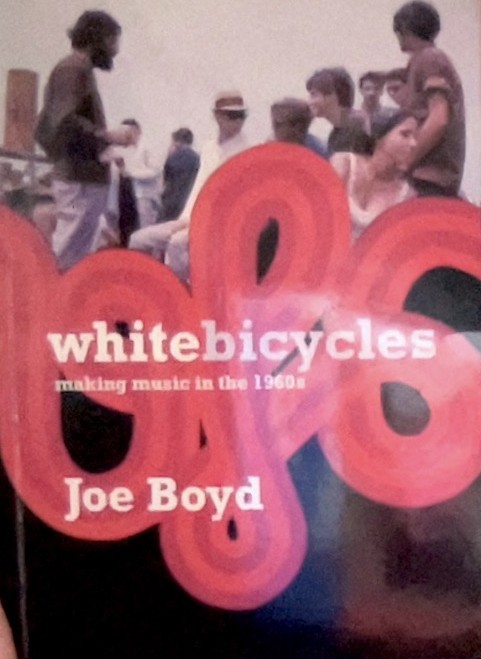Inspiring Older Readers
 posted on 17 Apr 2023
posted on 17 Apr 2023
White Bicycles: Making Music in the 60s by Joe Boyd
The record producer, promoter, film-maker and writer Joe Boyd seems in many ways to have led a charmed life: patrician, Harvard educated, talented, boyishly good-looking, and always in the right place at the right time. It is this life spent in the music business that he captures so brilliantly and apparently effortlessly in his 2005 memoir, White Bicycles. (Named, incidentally, after the free white bicycles Amsterdam’s radical provo activists made available in the mid-60s – a sort of early anarchist eco-bikes initiative.)
His first job was for George Wein, promoter of the Newport Jazz Festival, who needed a tour manager for the blues and gospel acts he had touring the Southern states of the US in 1964. At that time volunteers, largely students, were working in considerable danger as voter registration and civil rights activists in the segregated states of the American South. Boyd and his buddies – most of whom were in fact activists from Students for a Democratic Society (SDS) – often found themselves followed along the backwoods dirt roads at night, while the Mississippi cabin they were staying in still bore bullet holes from a recent drive-by shooting. It was genuinely dangerous, perhaps more so than Boyd realised at the time: just three months later, James Chaney, Andrew Goodman and Michael Schwerner, three young civil rights activists in their early twenties, were abducted and murdered in Mississippi by Klan members and local police.
In a term off from Harvard Boyd gets temporary work at Contemporary Records, the jazz label founded by Lester Koenig in Los Angeles in 1951. Koenig was a former Hollywood scriptwriter. Blacklisted during the McCarthy era he turned his hobby of recording jazz bands into a business. Then, back on George Wein’s payroll and back in New York City, Boyd begins work to help organise the forthcoming Newport Jazz Festival. On his first day in Wein’s rather plush Upper West Side offices he meets Thelonious Monk.
He moves to London and it is here that the story gets really interesting. Along with notorious 60s ‘face’, photographer, activist and journalist, John ‘Hoppy’ Hopkins, the pair found what becomes the hippy Mecca of UFO, held in a run-down basement Irish bar called The Blarney. Within months they are at the heart of everything that is happening (in all senses of that word) in London’s emerging countercultural underground.
But by 1967 UFO is collapsing, financial chaos, soaring costs, drugs, police harassment, factional battles, and exhaustion all playing a part. It is at this point that Boyd finally realises his real ambition: he sets up Witchseason Productions and launches what will become an illustrious career in record production. Pink Floyd, Fairport Convention, John Martyn, The Incredible String Band, Chris McGregor’s Brotherhood of Breath, and Nick Drake are just some of the acts whose records Boyd produced during the 60s and early-70s.
Most memoirs of the Sixties, especially music business memoirs, tend to be sloppily written and/or ghost-written, in any case often over-long and self-aggrandising. If this description were true of White Bicycles then the book would already have been forgotten. What makes it different – indeed, what makes it a classic of its kind – is the elegance of Boyd’s prose and his alertness to the inherent and self-serving contradictions of the so-called Swinging Sixties. In this regard he is an especially sharp-eyed observer, rarely cynical but always unflinchingly realistic. For example:
‘Beneath the surface, the progressive sixties hid all manner of unpleasantness: sexism, reaction, racism and factionalism… The agape spirit of ’67 evaporated in the heat of ugly drugs, violence, commercialism and police pressure. In Amsterdam, people started stealing and repainting the white bicycles.’
I also treasure the book for its flashes of wit and its marvellous descriptive vignettes. Here he is writing about the new, ruthless manager-hustlers who were moving into London’s music scene in the mid-60s, characters such as Denny Cordell and Tony Secunda:
‘Cordell and Secunda were an unlikely pair… Secunda came from South London and had knocked around the worlds of music and professional wrestling since the early sixties. He was a reptilian hustler who bragged of his time in prison but was possessed of a ready wit and sinister charm. Cordell was as dapper and cool as Secunda was fevered and scheming.'
Or The Who’s managers:
‘There were other pairings like this around Soho: the cockney Chris Stamp and the Bohemian aristocrat, Kit Lambert…for example. Soho that year was like the steppes in AD350, with Visigoths, Ostrogoths, Vandals and Huns queuing up to pillage, destabilize and eventually take over the Roman Empire.’
Of the charming Scottish hippy, Robin Williamson, founder of The Incredible String Band, he writes:
‘…Robin conversed engagingly in a lilting, heavily elocuted, burred Scots accent. His manner was somewhere between a hippy and a nineteenth-century parlour bard and he glowed with self-assurance.’
Boyd mourns those who became casualties of the Sixties but says of himself:
‘And as for me, I cheated. I never got too stoned. I became the éminence grise I aspired to be, and disproved at least one sixties myth: I was there, and I do remember.’
If the music, culture and politics and of the 1960s don’t interest you, then it is unlikely that Boyd’s book will. But if they do, then believe me, you are in for a rare treat. I can’t think of another Sixties memoir that achieves its same high standards. This is the third time I have read it and each time I have found something new to enjoy in it. Very highly recommended indeed.
Alun Severn
April 2023